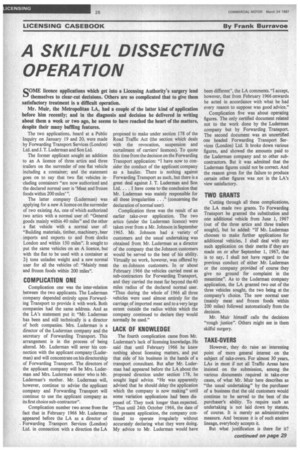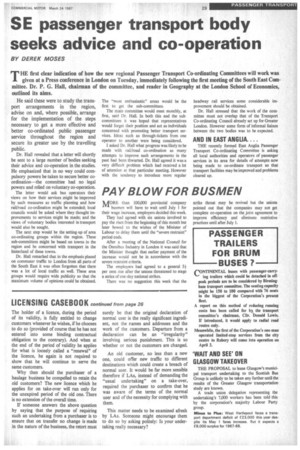A SKILFUL DISSECTING OPERATION
Page 28

Page 31

If you've noticed an error in this article please click here to report it so we can fix it.
ROME licence applications which get into a Licensing Authority's surgery lend 1..' themselves to clear-cut decisions. Others are so complicated that to give them satisfactory treatment is a difficult operation.
Mr. Muir, the Metropolitan LA, had a couple of the latter kind of application before him recently; and in the diagnosis and decision he delivered in writing about them a week or two ago, he seems to have reached the heart of the matters, despite their many baffling features.
The two applications, heard at a Public Inquiry on January 19 and 20, were made by Forwarding Transport Services (London) Ltd. and J. T. Luderman and Son Ltd.
The former applicant sought an addition to an A licence of three artics and three trailers on the surrender of one flat vehicle including a container; and the statement goes on to say that two flat vehicles including containers "are now authorized and the declared normal user is 'Meat and frozen foods within 200 miles' ".
The latter company (Luderman) was applying for a new A licence on the surrender of two existing As, one of which authorized two artics with a normal user of: "General goods mainly within 40 miles" and the other a flat vehicle with a normal user of: "Building materials, timber, machinery, beer imports and exports to and from docks London and within 150 miles". It sought to put the same vehicles on an A licence, but with the flat to be used with a container at 2+ tons unladen weight and a new normal user for all the vehicles of: "Mainly meat and frozen foods within 200 miles".
COMPUCATION ONE Complication one was the inter-relation between the two applicants. The Luderman company depended entirely upon Forwarding Transport to provide it with work. Both companies had the same address. And as the LA's statement put it: "Mr. Luderman has been and still technically is a director of both companies. Mrs. Luderman is a director of the Luderman company and the secretary of Forwarding Transport. This arrangement is in the process of being altered. Mr. Luderman will sever his connection with the applicant company (Luderman) and will concentrate on his directorship of Forwarding Transport. The directors of the applicant company will be Mrs. Luderman and Mrs. Luderman senior who is Mr. Luderman's mother. Mr. Luderman will, however, continue to advise the applicant company and Forwarding Transport will continue to use the applicant company as its first choice sub-contractor".
Complication number two arose from the fact that in February 1966 Mr. Luderman appeared before the LA as a director of Forwarding Transport Services (London) Ltd. in connection with a direction the LA proposed to make under section 178 of the Road Traffic Act (the section which deals with the revocation, suspension and curtailment of carriers' licences). To quote this time from the decision on the Forwarding Transport application: "I have now to consider the conduct of the applicant company as a haulier. There is nothing against Forwarding Transport as such, but there is a great deal against J. T. Luderman and Son Ltd. . . . I have come to the conclusion that Mr. Luderman was mainly responsible for all these irregularities . . ." (concerning the declaration of normal user).
Complication three was the result of an earlier take-over application. The two artics (under the Luderman licence) were taken over from a Mr. Johnson in September 1965. Mr. Johnson had a variety of customers and the usual undertaking was obtained from Mr. Luderman as a director of the company that the Johnson customers would be served to the best of his ability. Virtually no work, however, was offered by the ex-Johnson customers. In or about February 1966 the vehicles carried meat as sub-contractors for Forwarding Transport, and they carried the meat far beyond the 40 miles radius of the declared normal user. "Thus during the whole of 1966 all three vehicles were used almost entirely for the carriage, of imported meat and to a very large extent outside the radius within which the company continued to declare they would normally be used."
LACK OF KNOWLEDGE
The fourth complication came from Mr. Luderman's lack of licensing knowledge. He said that until February 1966 he knew nothing about licensing matters, and put that side of his business in the hands of a transport consultant. But after Mr. Luderman had appeared before the LA about the proposed direction under section 178, he sought legal advice. "He was apparently advised that he should delay the application which the company is now making" until some variation applications had been disposed of. They took longer than expected. "Thus until 24th October 1966, the date of the present application, the company continued to operate irregularly without accurately declaring what they were doing. My advice to Mr. Luderman would have been different", the LA comments. "I accept, however, that from February 1966 onwards he acted in accordance with what he had every reason to suppose was good advice."
Complication five was about operating figures. The only certified document related not to the work done by the Luderman company but by Forwarding Transport. The second document was an uncertified one headed Forwarding Transport Services (London) Ltd. It broke down various figures, and showed the amounts paid to the Luderman company and to other subcontractors. But it was admitted that the Luderman figures could not be correct. And the reason given for the failure to produce certain other figures was not in the LA's view satisfactory.
TWO GRANTS
Cutting through all these complications, the LA made two grants. To Forwarding Transport he granted the substitution and one additional vehicle from June 1, 1967 (out of the three artics and three trailers sought), but he added: "If Mr. Luderman chooses to make further applications for additional vehicles, I shall deal with any such application on their merits if they are made on or after September 1, 1967, that is to say, I shall not have regard to the previous conduct of either Mr. Luderman or the company provided of course they give no ground for complaint in the meantime". As to the Luderman company application, the LA granted two out of the three vehicles sought, the two being at the company's choice. The new normal user (mainly meat and frozen foods within 200 miles) followed automatically from the decision.
Mr. Muir himself calls the decisions "rough justice". Others might see in them skilful surgery.
TAKE-OVERS However, they do raise an interesting point of more general interest on the subject of take-overs. For almost 30 years, LAs in most if not all Traffic Areas have insisted on the submission, among the various documents required in take-over cases, of what Mr. Muir here describes as "the usual undertaking" by the purchaser of a business that the old customers would continue to be served to the best of the purchaser's ability. To require such an undertaking is not laid down by statute, of course. It is merely an administrative measure. And because it is of such ancient lineage, everybody accepts it.
But what justification is there for it? The holder of a licence, during the period of its validity, is fully entitled to change customers whenever he wishes, if he chooses to do so (provided of course that he has not entered into some binding contractual obligation to the contrary). And when at the end of the period of validity he applies for what is loosely called a "renewal" of the licence, he again is not required to show that he will continue to serve the same customers.
Why then should the purchaser of a haulage business be compelled to retain the old customers? The new licence which he applies for on take-over will run only for the unexpired period of the old one. There is no extension of the overall time.
If someone answers the above question by saying that the purpose of requiring such an undertaking from a purchaser is to ensure that on transfer no change is made in the nature of the business, the retort must surely be that the original declaration of normal user is the really significant ingredient, not the names and addresses and the work of the customers. Departure from a declaration can be an "irregularity" involving serious punishment. This is so whether or not the customers are changed.
An old customer, no less than a new one, could offer new traffic to different destinations which could create a breach of normal user. It would be far more sensible therefore if LAs, instead of demanding the "usual undertaking" on a take-over, required the purchaser to confirm that he was aware of the terms of the normal user and of the necessity for complying with them.
This matter needs to be examined afresh by LAs. Someone might encourage them to do so by asking politely: Is your undertaking really necessary?








































































































